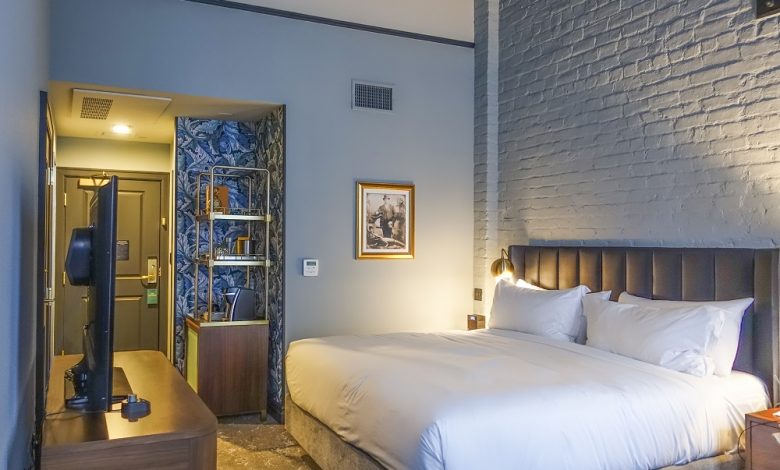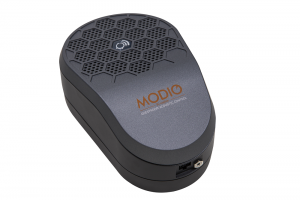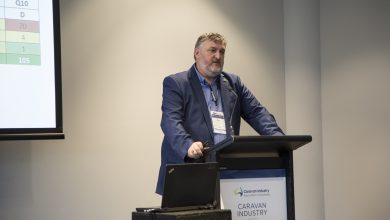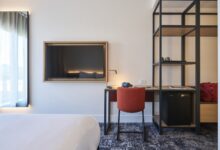
Mask noise, make waves, wow guests
Loudness isn’t the only noise-making menace for accom providers to keep at bay…
In order to secure guest comfort and stave off complaints, acoustic control must target noise pollution.
Excessive noise is a central concern for all accommodation types, whether you manage a hotel, apartment complex, or short stay property.
As anyone who’s stayed in a hotel undergoing renovations or lived in an apartment next door to road works can attest – nothing can sour your mood quite like a jackhammer.
Noise can also intrude from neighbouring televisions, arguments overheard across balconies or through walls, a squeaky, loud elevator can be infuriating, the rattle of an air conditioning unit, particularly annoying.
Depending on your locale, vibrations from nearby nightclubs, bars, or restaurants can persist until closing time, constant external noise from traffic or 5.00 AM rubbish bin collections can also drive complaints, as well as the aforementioned building work plaguing many of us at the moment due to the huge level of development sweeping across most Australian cities.
Pandemic noise pandemonium
Amid the cacophony, accommodation operators struggle to satisfy guests and tenants who complain about disrupted sleep. With frayed nerves, many residents and guests report a lack of quality sleep that leaves them in a state of perpetual anxiety and tenants who live with ongoing noise even describe it as ‘soul-destroying’.
Since the pandemic, noise is even more of an issue for tenants and guests who have been working from home or from a guest room during the day. Noise then not only interferes with sleep but livelihoods.
Noise disturbance at your establishment may then lead to negative online reviews that can destroy your property’s reputation and topple future bookings. Noise complaints consistently top guest satisfaction surveys.
The kicker is that noise levels don’t actually need to be that ‘high’ to cause a problem!
Niklas Moeller, Vice President at K.R. Moeller Associates, which develops and manufactures sound masking technology, told us the main problem isn’t usually that noises are loud, but that the level of background noise within the guest room is so low that even low-volume noises feel disruptive. You can think of it as ‘the library effect’.

Sound-masking to solve sound woes
For Niklas, noise control should be priority number one at any accommodation business:
“Because prioritising your biggest issues is simply good business, and noise is one of the top complaints within the industry.”
He added: “It significantly impacts guest satisfaction, as well as a property’s reputation and profitability, but operators often struggle to find workable solutions for this problem and end up simply trying to ignore it.
In order to address this persistent source of guest dissatisfaction, operators can now turn to solutions like sound masking that, while relatively new to the hospitality industry, have proven very effective in many other environments, such as commercial offices and hospital patient rooms.”
Niklas explained that while an accommodation operator might direct most of their attention towards an obvious potential noise complaint like traffic or road works, it’s important to remember that any property will expose guests to numerous sound issues emanating from a variety of sources.
If the conditions inside your guest rooms allow for one type of noise to be disruptive, odds are that many other sounds will begin to intrude as well.
Operators often assume that noise pollution is something out of their control but there are, in fact, ways to solve acoustical challenges in new and existing buildings.
New-build noise-mitigating recommendations
Niklas explained that “to address noise there are a variety of acoustical design strategies that would have to be considered for new builds”.
He said: “When it comes to the interior, it generally means using the layout to keep noisier areas away from those requiring quiet, reducing the level of noise produced by sources such as mechanical equipment and, of course, following the ‘ABC Rule’ of acoustics:
- Absorbing noises to reduce the distance over which they travel
- Blocking noises from travelling in the first place (also called isolating)
- Covering noises using sound masking technology
“While reducing, absorbing, and blocking noise only addresses specific noise sources or sound paths, sound masking works on all of them. That’s because masking works ‘at the guest’s ear’, it either completely covers up noises or reduces their disruptive impact by minimizing the amount of change the guest experiences in their acoustical conditions.”
Retrofit solutions for existing properties
When it comes to retrofitting treatments Niklas advised: “Although there are several acoustical solutions that can be retrofitted, most are expensive and address only particular noises or sound paths. In an operating hotel, they can also be difficult to install without creating more noise or losing room nights. Depending on the noise source, options include installing new windows, doors, and acoustical sweeps, adding layers of gypsum between rooms, and replacing/fixing noise sources such as mechanical equipment.
“There is also the sound masking technology, MODIO Guestroom Acoustic Control, that we have designed specifically for hotels, and it can be retrofitted at low cost, with no lost room nights.”

He added: “The simplest solution is to remove the offending noise, but that isn’t always possible; for example, an operator can’t divert traffic. In these cases, other acoustical strategies must be undertaken.
“When it comes to noises generated outside the guest room, the standard approach is to increase the isolating properties of walls, windows, and doors.
“However, this isn’t easily done in an existing property. Ironically, it can also exacerbate acoustical issues because it not only reduces the level of unwanted noise intruding into the room, but also the background sound level within the room itself, making any remaining (even lower level) noises more apparent to occupants and guests.
Despite the measures taken, guests may still describe the room as ‘noisy’. The same is often true of adding absorption and, in any case, most guest rooms already feature sufficient absorption in the form of beds, bedding, soft furnishings, window coverings and flooring.
“The quickest and least disruptive solution is perhaps the least obvious to those unfamiliar with the mechanics of acoustics: address the low background sound level within the guest room. MODIO allows guests to control this aspect of their environment with the turn of a dial. dial. You can’t get much simpler than that!”
Mandy has over 17 years of accommodation and tourism industry writing experience and is Editor of AccomNews & Resort News, Publisher of SchoolNews & Director of Multimedia Pty Ltd. She is a retired registered nurse with a 25-year NHS career that followed a few unforgettable years in hotel housekeeping.







